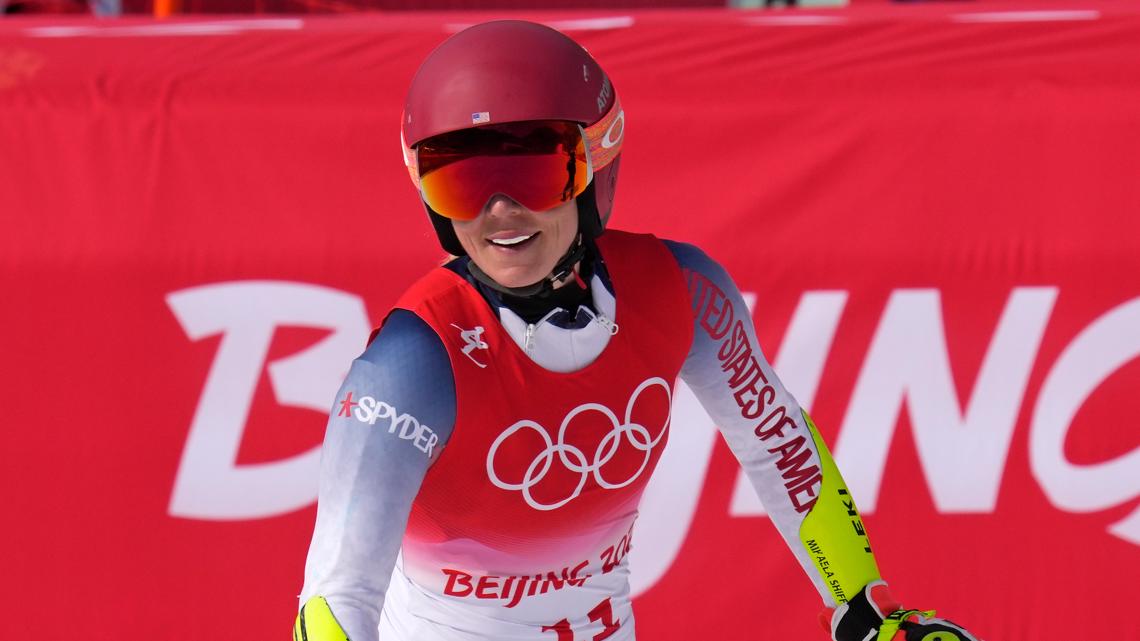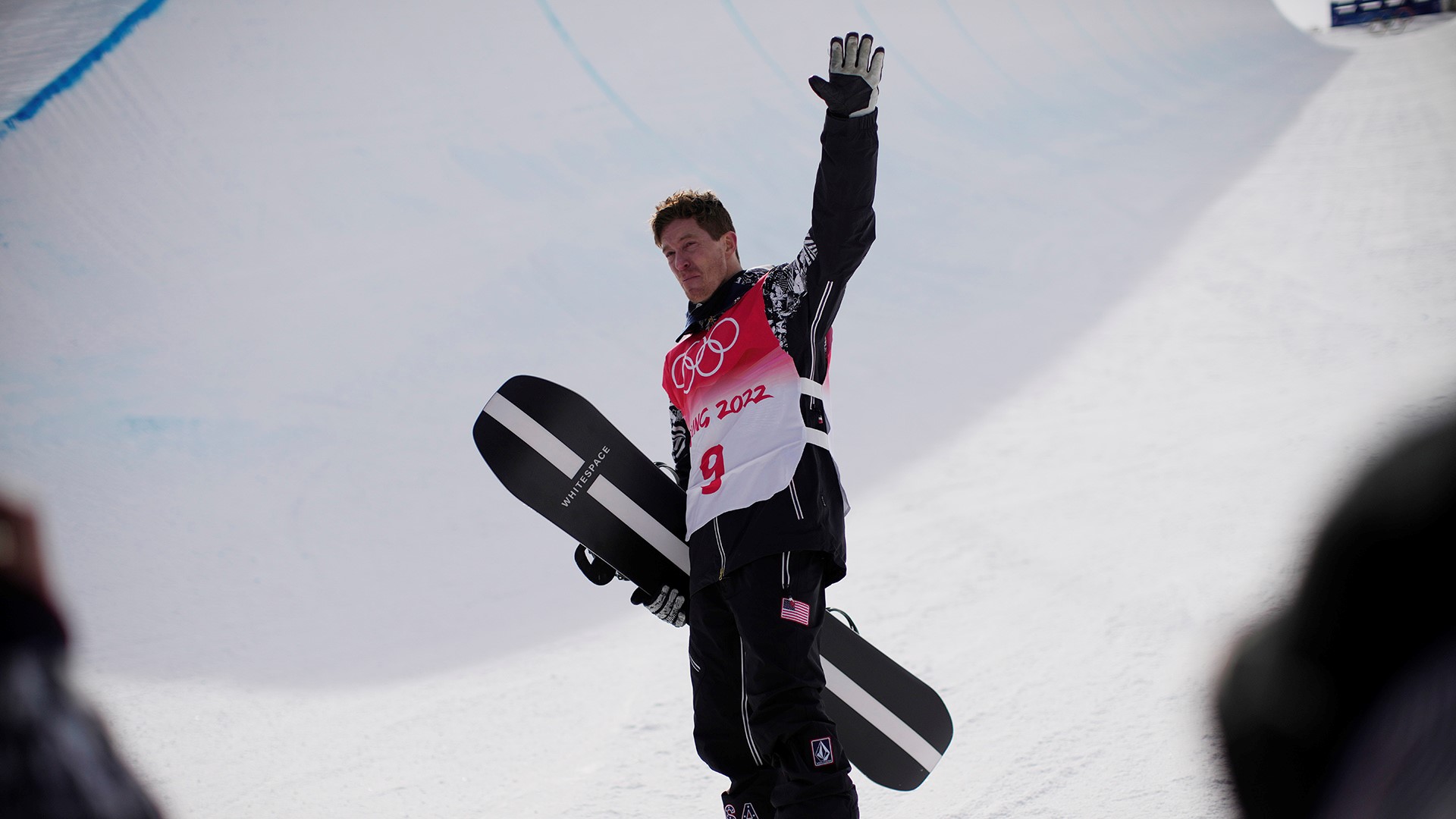Laying in bed ahead of her third race of the Beijing Olympics, Mikaela Shiffrin could not stop dreaming about what awaited, envisioning a sequence that unfolded like her initial two over-in-a-blink events.
“Just repetitive. The whole night long. And I kept kind of waking up from it and then going back to sleep. And it just kept happening: I skied out on the fifth gate. Surprise!" she said with a laugh. "It really felt pretty awful.”
Who among us can't relate to the concept of work-related anxiety? We still must get back on the clock — and that's precisely what the American did Friday, competing in the super-G at the Winter Games and placing ninth behind winner Lara Gut-Behrami of Switzerland in a field of 44 ski racers.
Still, Shiffrin was pleased to say she made it to the end this time.
“It's a really big relief to be here now in the finish, having skied a run well. I wasn't skiing safe or anything. But I also did get to the finish and that’s really nice for my heart to know," she said, tapping her chest with fingers on her right hand, “that it’s not totally abandoning everything I thought I knew about the sport.”
Hard to believe as it might be that someone as accomplished as Shiffrin is — she has won three medals, two gold, from past Olympics; she owns three World Cup overall titles and six world championship golds — would harbor such doubts, they were there.
“You start to dwell on yourself, (ask) if your skills are good enough to even do it,” said Norwegian ski racer Aleksander Aamodt Kilde, Shiffrin's boyfriend and a two-time medalist in Beijing, who watched her compete Friday. “So that’s the most challenging part.”
That's because of her surprisingly poor outings in the giant slalom on Monday and slalom on Wednesday. Those are both two-leg events, but she never even made it past five gates in the first run of either.
They also are her best events: She won the slalom at the 2014 Sochi Games, the giant slalom at the 2018 Pyeongchang Games.
“I failed twice to do the job that I am supposed to do,” is how she put it.


Those two performances — including her first “Did Not Finish” in a giant slalom since Jan. 23, 2018, a streak of 30 races — weighed on her.
Made her unsure whether she wanted to take part in the super-G for the first time at an Olympics (she was the 2019 world champion in the event).
Made her unclear on whether she was “up to the challenge,” to use her phrase.
“After the last week, there’s been a lot of emotional fatigue, and I feel emotionally weary right now. There’s definitely a sense of dullness and you can’t have that (in) racing — especially not racing speed,” said Shiffrin, who was undecided about entering the super-G until taking training runs on the race hill Thursday afternoon. “But when we got out today, I just feel a little bit more settled. A little bit quieter. Trying to keep some calmness and just trying to focus on the task at hand, so I could put my attention where I wanted and ski the hill and the course properly."
Now Shiffrin has a few days to practice the downhill and figure out whether she wants to enter that on Tuesday.
About 4 1/2 hours before Friday's super-G, Shiffrin posted a note on Twitter saying how grateful she was “to have the opportunity to refocus on a new race” and thanking people for their support during a tough 48 hours for her.
Then, a little more than two hours before she would leave the start hut for real under a bright blue sky, Shiffrin took an inspection run down the hill, stopping a little past the finish to lean forward with her red ski poles tucked under the tops of her arms.
Maroon helmet bowed, Shiffrin appeared to be visualizing the course known as The Rock at the Yanqing Alpine Skiing Center. She placed her gloves together in front of her and swayed them back and forth, as if recreating in her mind the turns and swerves necessary to navigate the path.
When it was go time, Shiffrin actually started well enough, reaching the initial check point in 12.66 seconds — ahead of Gut-Behrami’s pace. But from there, Shiffrin lost touch with the leader, losing hundredths, then tenths, of seconds along the way, before closing in 1 minute, 14.30 seconds, which was 0.79 behind Gut.
Shiffrin was not attacking the course at full-force — “a little careful, here and there,” is the way Kilde described the skiing.
“Getting up on the horse again. Get a good run. Get a good feeling. Have some fun skiing. She really enjoyed it. .. She’s back,” Kilde said, then added: “She was never gone, I would say.”
The two of them found each other after the race and walked side-by-side along the snow-covered path from the race course to the athletes’ lounge.
As for the result, Shiffrin acknowledged afterward she hadn’t considered herself a true medal contender.
And she sounded just fine with that.
“It's possible to feel both proud of a career and sad for the moment you’re in,” Shiffrin said. “But ... there was nothing sad about today.”

